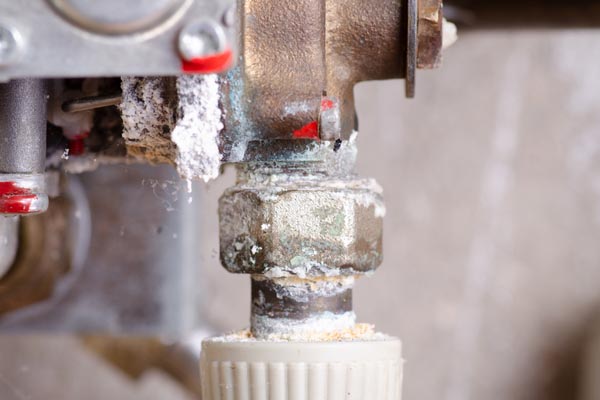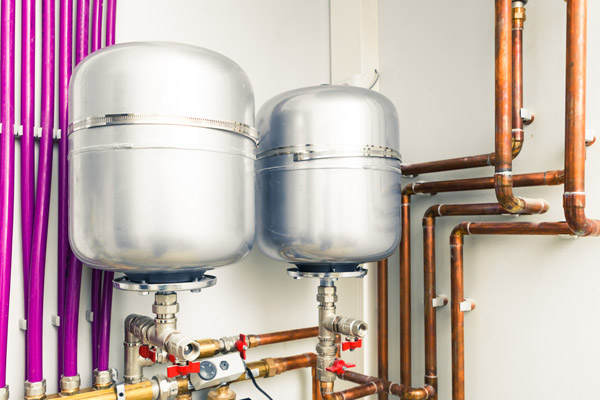Table of Contents
- Five Causes of Boiler Leakage
- 1. Issues with the Boiler Pressure Relief Valve
- 2. Corrosion or Damage in Boiler Pipes
- 3. Compromised Boiler Seals and Gaskets
- 4. Issues with the Boiler Expansion Tank
- 5. Corrosion in the Boiler Heat Exchanger
- Indications of a Boiler Leak
- Preventative Measures and Maintenance for Boilers
- The Value of Expert Boiler Inspections and Maintenance
- Homeowner Guidelines for Maintaining Boiler Efficiency and Preventing Leaks
- Considering a DIY Boiler Repair?
- Conclusion
- Call Lake Region Energy for Your HVAC Needs
A reliable boiler is vital to appreciating its role in a successful home heating system. It is a vital heat source, offering a snug and comfortable environment throughout the chillier months. However, boiler leaks are a frequent and disruptive issue many homeowners face. These leaks can decrease the system’s overall effectiveness and spark safety and maintenance concerns. This article uncovers the factors leading to boiler leaks, illuminates this common problem, and discusses practical approaches to remedy and avert water leaking from boiler.
Five Causes of Boiler Leakage

1. Issues with the Boiler Pressure Relief Valve
The boiler’s pressure relief valve controls and releases excess pressure to protect the boiler from over-pressurization, activating to expel water or steam if the internal pressure exceeds safety limits.
A leaking pressure relief valve can result from multiple issues, predominantly pressure buildup within the system, often caused by a defective expansion tank or other factors like sediment accumulation, valve malfunction, or incorrect installation.
Ignoring problems with the pressure relief valve poses significant safety risks, as a malfunctioning valve can unexpectedly release hot water or steam, causing harm to the boiler, potential scalding injuries, property damage, and in extreme cases, boiler explosions. Regular inspections, maintenance, and prompt attention to valve-related issues are crucial for boiler safety and performance.
2. Corrosion or Damage in Boiler Pipes

Boiler pipes serve as conduits, transferring heated water or steam from the boiler to components like radiators and baseboard heaters.
Corrosion of boiler pipes can be caused by their age, water quality, and chemical interactions, with prolonged heat and pressure leading to degradation, rust, or scale. Poor water quality and chemical reactions can accelerate this corrosion, causing water leaking from boiler.
Leaks in the boiler system often result from pipe corrosion, leading to water wastage, reduced efficiency, and damage to nearby components. Corroded pipes are weaker and prone to failure, and the narrowing from corrosion can hinder water or steam flow, decreasing heat distribution.
3. Compromised Boiler Seals and Gaskets
Seals and gaskets act as protective barriers. They are designed to form watertight and airtight seals between various boiler components, ensuring that water and steam are effectively contained within their respective areas.
The deterioration of seals and gaskets is commonly attributed to regular wear and tear, the impact of high temperatures, and their interaction with chemicals or minerals found in the water. Such conditions can result in:
- Gradual weakening
- Loss of elasticity
- Becoming brittle
- Increased susceptibility to breakdowns
- Overall degradation
- Accumulation of deposits
- Accelerated deterioration leading to potential failure
Leaks from faulty seals and gaskets can cause water leaking from boiler and can significantly impair the boiler’s performance and energy efficiency. When these components are compromised, water or steam may seep out of their designated channels, causing water loss and a drop in system pressure. As a result, the boiler is forced to exert more effort to sustain the necessary temperature and pressure levels, leading to increased energy consumption and reduced efficiency. Such leaks could also let air contaminants into the system, further hampering its operational effectiveness.
4. Issues with the Boiler Expansion Tank

The expansion tank in a boiler system plays a key role in managing pressure changes, designed to handle the water’s expansion and contraction during heating and cooling. Issues arise when the tank gets water-clogged due to a faulty bladder or diaphragm, defective air valves, or inadequate maintenance, leading to increased pressure and potential water leaks in the system.
Improper air pressure settings can result in insufficient pressure relief during the boiler’s heating cycle. This situation presents potential safety hazards and adversely affects the boiler’s performance and energy efficiency.
5. Corrosion in the Boiler Heat Exchanger
The heat exchanger in a boiler moves heat from the combustion chamber to the water, which is then circulated throughout the heating system. Corrosion of the heat exchanger can occur due to the quality of water chemistry and the accumulation of minerals over time. When the heat exchanger is affected by corrosion, it can lead to issues such as water leaks or the release of dangerous gases, including carbon monoxide, into the heating system. These problems reduce the boiler’s efficiency and present significant health and safety risks.
Indications of a Boiler Leak
Homeowners should be vigilant for signs of a boiler leak, such as visible water puddles or drips near the boiler, discoloration or water stains on nearby ceilings or walls, and a noticeable drop in system pressure. Addressing these signs promptly is crucial to prevent further damage to the boiler and its surroundings, avoid declining operational efficiency, mitigate safety hazards, inhibit mold growth, and prevent electrical issues. If any indications of a leak are observed, immediate action, including consulting a qualified technician for evaluation and repairs, is imperative.
Preventative Measures and Maintenance for Boilers
- Arrange for professional boiler inspections annually.
- Regularly monitor and maintain appropriate water chemistry, incorporating additives as necessary.
- Promptly address and repair any signs of corrosion or damage in pipes.
- Ensure the pressure relief valve is operational.
- In colder regions, insulate both pipes and the boiler to avert issues related to freezing.
- Conduct routine checks on seals, gaskets, and expansion tanks for early signs of wear or damage.
The Value of Expert Boiler Inspections and Maintenance
- Having certified technicians conduct inspections can preemptively pinpoint issues that might result in leaks.
- Professional maintenance includes cleaning and tuning the boiler to maximize its efficiency.
- An expert’s evaluation ensures the boiler operates safely and adheres to all regulatory standards.
Homeowner Guidelines for Maintaining Boiler Efficiency and Preventing Leaks
- Regularly check the boiler’s pressure and temperature.
- Be attentive to any odd noises or unusual smells emanating from the boiler.
- Act promptly upon noticing any issues by consulting with an HVAC specialist.
- Adhere strictly to the manufacturer’s instructions regarding maintenance, operation, and safety protocols.
- Maintain a clean and well-ventilated environment around the boiler.
- Consider establishing a preventive maintenance agreement with a reputable service provider.
Considering a DIY Boiler Repair?

When dealing with water leaking from boiler, prioritizing professional HVAC technician services over DIY approaches is vital. DIY attempts carry risks such as limited expertise, potential safety issues, and the possibility of worsening the problem. On the other hand, professional technicians offer extensive experience, access to specialized tools, and a thorough understanding of safety regulations. Their proficiency ensures accurate diagnostics and repairs, adherence to safety standards, and prevention of additional issues. Therefore, opting for professional assistance is the most secure and effective method for handling boiler leak repairs.
Conclusion
Boiler leaks, such as water leaking from boiler, can be caused by issues like pressure valve malfunctions, pipe corrosion, defective seals and gaskets, expansion tank problems, and heat exchanger corrosion. Prompt recognition and response to these signs are vital for preventing further damage and safety risks. It’s recommended to seek professional HVAC technician assistance for effective diagnosis and repair, ensuring the boiler’s safety and efficiency, and maintaining home warmth and comfort.
Call Lake Region Energy for Your HVAC Needs

Lake Region Energy is a distinguished provider of heating and cooling services in Maine and New Hampshire. Our team comprises highly trained and professionally certified technicians who excel in HVAC tune-ups, repairs, installations, and replacements. We take pride in offering superior quality services to our customers.
At Lake Region Energy, we recognize the significance of maintaining a comfortable and energy-efficient home. That’s why we provide competitively priced services. Our maintenance offerings are tailored to enhance comfort while reducing energy costs. If you’re in need of HVAC repair or replacement, our knowledgeable technicians are ready to suggest the most suitable solutions, always considering your budget. We stand firmly behind our work, ensuring customer satisfaction with a guarantee.
To arrange a service appointment, give us a call. We provide free, in-home estimates to assist you in making well-informed decisions about your HVAC systems. Trust Lake Region Energy to deliver outstanding HVAC services that will surpass your expectations!
For more information about our HVAC services or fuel deliveries, be sure to contact Lake Region Energy. You can click here to contact us, or you can call us at (207) 839-5500 to find out more. Click the link to view our service area.
Related Articles:
